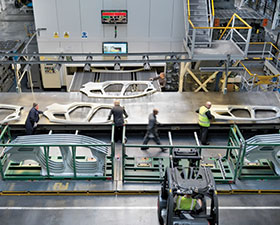

The fourth industrial revolution – also called Industry 4.0 – is in full progress and has already begun to change the manufacturing landscape fundamentally. In 2016, we witnessed the rise of the Internet of Things (IoT) as a driver of Industry 4.0. Manufacturing companies have recognised that the pressure for high efficiency, increasing competition and demands for flexibility require investment in IoT projects. Yet in terms of interconnectivity and IoT experience, manufacturers seem to be lagging behind other sectors, such as the logistics industry.
One thing is certain: Industry 4.0 will transform manufacturing business models in the long term. So how can manufacturers leverage IoT to make their business models sustainable and viable for the future? And how can they survive the fourth industrial revolution and secure their market relevance against competitors?
Five trends have manifested themselves in the manufacturing industry that will substantially change the way of doing business:
1. Service transformation: Companies are increasingly introducing additional service components to ramp up their portfolios and foster long-lasting customer loyalty. New services around existing products are designed to create an entire service ecosystem which promotes ongoing customer relationships instead of one point interactions.
2. Everything-as-a-Service: Software-as-a-Service was just the beginning. Companies across all industries are switching from business models based on product ownership to pay-per-use contracts. Manufacturers will increasingly sell results and services instead of products, for instance mobility instead of cars. Customers will only pay for a service when and as long as they need it, transferring storage and maintenance costs to manufacturers.
3. Individualisation: Today, customers are demanding products and services tailored to their specific needs, rendering large-scale mass production useless and inefficient, and changing manufacturers’ business models from “we sell what we make” to “we make what we sell”. However, the possible combination of hundreds or thousands of production options and features for customised products entails huge complexity that requires powerful and reliable systems to process these massive amounts of data correctly and efficiently.
4. Hypercompetition: The manufacturing industry is witnessing a shift in the competitive environment. Significantly increasing competition goes along with a “war for talent”. Companies compete against each other, not only for customers and market share, but also for talented employees who can secure their future in a digitised world.
5. Digital convergence: Manufacturers’ production and supply chains are shifting to the digital sphere, with new products and services involving various technologies such as RFID, WLAN, locationing or video technology. These technologies and the different kinds of data they deliver are merged and accessed through a variety of devices and applications as the physical and the digital world are becoming increasingly connected through IoT.
Every manufacturing company is impacted by at least one of these five trends. Right now, IoT still looks like a mysterious, impenetrable area to many of them. IoT projects are stalled or not put into practice because of the complexity of data integration and a lack of know-how. But it’s worth taking the challenge. IoT connects manufacturers with suppliers, customers, their own staff as well as machines and materials along the entire production chain, providing businesses with real-time visibility into their operations and processes.
It helps manufacturers improve and expand their services by enabling them to respond quickly to demands or issues, ensuring sustainable customer loyalty. Companies that embrace IoT will be able to benefit from the service transformation and everything-as-a-service trends. In addition, powerful IoT platforms provide the infrastructure necessary to process and integrate huge data streams and to reduce the complexity of business processes that arise, for instance from the mass individualisation of products. Finally, manufacturers’ business models are improved and rendered more resistant through increased productivity and a simultaneous reduction of costs, for instance through predictive maintenance and reduced production downtime.
Companies should therefore concentrate on the benefits of digitisation and not bury their heads in the sand in the face of short-term IoT challenges. Instead, they should consider IoT as an indispensable tool that equips them with actionable insights and productivity gains; and which delivers the competitive edge they need to survive in a hypercompetitive environment and successfully master the far more long-term industry 4.0 challenges for their business models.
For more information contact Neil Gouveia, Zebra Technologies, +27 (0)11 069 6210, [email protected], www.zebra.com

© Technews Publishing (Pty) Ltd | All Rights Reserved